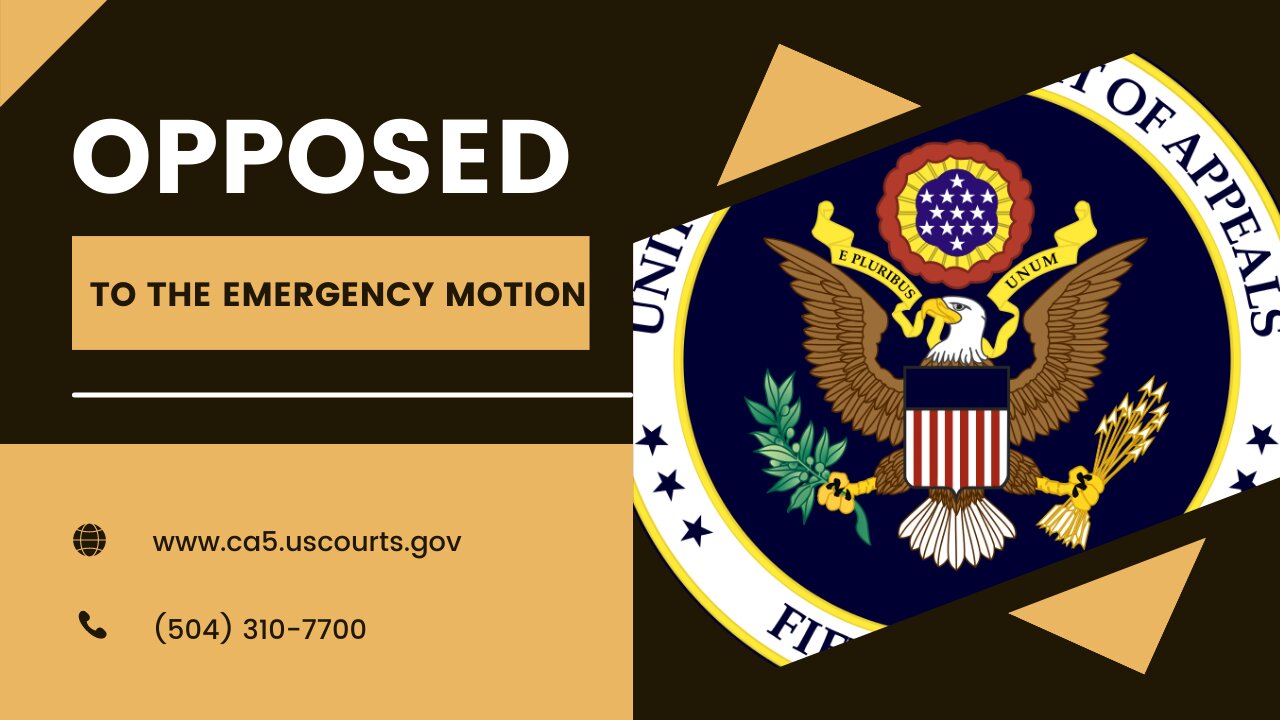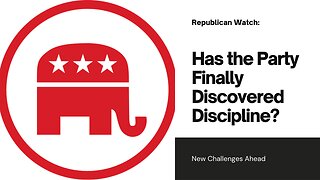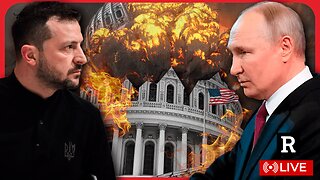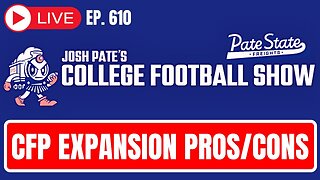Premium Only Content

Plaintiffs oppose emergency motion
Plaintiffs oppose emergency motion
By Terry A. Hurlbut
A recent update to Court Listener revealed new filings in the appeal of the preliminary injunction in Missouri v. Biden. The plaintiffs in that case have filed their motion to oppose the government’s emergency motion to stay pending appeal. They did this on the first working day after the “calendaring” of the case, showing that they’re not wasting time. Their response reminds the Fifth Circuit of the findings of the trial court.
Current status of the case
Court Listener maintains two docket pages, one following the case in the District Court, the other at the Appeals Court. The plaintiffs include the States of Missouri and Louisiana and five individuals who have suffered censorship on various platforms. These chiefly include Facebook, Twitter, YouTube, and the Spotify family – the only platforms that have shown willingness to obey orders.
After the trial judge enjoined the Biden administration from pressuring social media companies to censor their users, the government appealed. The Fifth Circuit Court of Appeals stayed the injunction administratively. But they also expedited the appeal – rapidly. Currently the Fifth Circuit has “calendared,” or scheduled, the case for oral argument on Thursday, August 10, 2023, at 1:00 p.m. CDT, in the En Banc Courtroom in the New Orleans courthouse. (They had scheduled it for 9:00 a.m. but have since moved the case to the afternoon.) The court also set these deadlines:
• Appellants’ brief due on July 25, 2023,
• Appellees’ brief due on August 4, 2023, and
• Appellants’ reply brief due on August 8, 2023.
While this was happening, John Sauer, Special Assistant Attorney General for Louisiana, on behalf of the plaintiffs, was negotiating with the government on when they were going to answer the original complaint – which they never have. Negotiations have broken down, and both sides submitted a Joint Status Report to the trial judge (Terry A. Doughty). In the meantime, the Plaintiffs have already filed their Appellees’ Brief – two and a half weeks ahead of time.
The plaintiffs oppose the motion
The Fifth Circuit’s Rules include a specific rule (27.3) governing emergency motions in non-capital cases. Emergency motions “must be supported by good cause,” and attorneys who file them frivolously are subject to disciplinary action.
The opposition brief runs to thirty-three pages, including cover page and tables of contents and authorities. It begins with a description of the censorship campaign, as Judge Doughty described it in eighty-two pages of his Memorandum Ruling to support his judgment. The plaintiffs describe direct pressure to remove specific content, and pressure to change their Trust and Safety policies. This is the source of – or the excuse for – the ridiculously complex YouTube Community Guidelines, the Facebook Community Standards, the Twitter Rules (at least as they once stood), and equivalents on Spotify, Pinterest, Instagram, and others.
To make their point, the brief lists a Who’s Who of media personalities and popular interview subjects. This includes the Disinformation Dozen, a list that NPR made and published more than two years ago. In this they relied on the Center for Countering Digital Hate – a name familiar to Twitter Files consumers. In forty pages, they described twelve specific persons – or actually thirteen, because they described two of them as a pair. They are: Joseph R. Mercola, D.O., Robert F. Kennedy, Jr., Ty and Charlene Bollinger, Sherri Tenpenny, Rizza Islam, Rashid Buttar, Erin Elizabeth, Sayer Ji, Kelly Brogan, Christine Northrup, Ben Tapper, and Kevin Jenkins. These are the “Twelve Leading Online Anti-vaxxers,” according to the CDDH.
Standing, harm, and other arguments
Then, counsel for the plaintiffs address six questions. At the top, taking up five pages, is standing. The defense constantly raises the issue of standing and insists that neither the States nor the individuals have any. In addition the plaintiffs address:
• Likelihood of prevailing on the merits,
• Irreparable injury to them from the staying of the injunction,
• The breadth of the injunction,
• The specificity or, to the contrary, the vagueness of the injunction, and
• Whether the injunction interferes with what the government may legitimately say in the discharge of its duties to the people.
The Missouri case has individual plaintiffs and State plaintiffs. Individuals claim standing because they have suffered flagging, content removal, and deplatforming. It is as if the government deprived an individual of a telephone listing because they didn’t like the telephone calls he made. The search engines reveal that the usual penalties for abusive telephony include fines and imprisonment. They do not include an injunction against a repeat offender from having a telephone account. Such is the equivalent penalty many of these plaintiffs have suffered. Or if they haven’t suffered that, then they’ve suffered a limit on their outreach. This actually affects everyone, because it means information challenging official narratives is less available. You have the right to listen, as the brief explicitly states. You also have the right to express an opinion or viewpoint. The government interfered with all of this.
The state plaintiffs and their standing
States, especially Missouri and Louisiana, claim three kinds of harm. First, the federal government has directly censored State governments and agencies, the same as individuals. Second, federal censorship interferes with the States’ rights to hear – again, to listen to – their citizens. If you are afraid to express your opinion, then you don’t, and the State cannot hear from you.
The third kind of standing involves the doctrine of parens patriae – the “parent of the country.” State governments act in that capacity to protect their “quasi-sovereign” interests. (That’s why we call them States, not provinces.) But the government maintains that no State may bring such an action in the federal courts. They cite as precedent the case of Massachusetts v. Mellon, 262 U.S. 447 (1923).
In 1921, Congress passed one of its first “welfare laws,” the Maternity Act. That act provided federal grants to States that provided for the “health and welfare” of infants and mothers. A Massachusetts citizen named Frothingham sued, saying the federal government was “taking” his property (i.e. his funds) without compensation. The State of Massachusetts brought a similar action, asserting parens patriae. A unanimous Supreme Court ruled for the federal government, saying all the people of the land, not just one taxpayer or all the taxpayers in one State, would have standing.
This case, say the Missouri plaintiffs, is different – because it affects Missouri and Louisiana and their duty to ensure freedom of speech for their citizens.
Likelihood of prevailing
The brief makes a simple argument: the federal government is violating the First Amendment. In fact the administration knows better than to ask the Court’s leave to go on violating the First Amendment. So they’re arguing that the injunction stops the government from speaking to an issue of public concern. The brief argues that the government may protest but not threaten. And a threat need not be explicit; it can also be subtle. But some of the threats were explicit. Whoever, in the government, wrote that “internally, we are considering our options on what to do about [Facebook’s lack of cooperation,” probably wishes he hadn’t written that, and for good reason. So must Rob Flaherty, who once wrote, “Are you … serious? I want an answer on what happened here and I want it today.” Except that he said what kind of serious, using an obviously abusive term.
“Defendants claim these threats are ‘unremarkable,” the brief continues. Now one might ask whether they are serious. As the plaintiffs make clear, the government did more than talk. They tied their warnings to specific adverse consequences for the companies involved. Plenty of precedent exists to accuse the government of threatening behavior.
Furthermore, a threat need not succeed in order to be actionable. Consider the Gab network, which went so far as to build its own infrastructure from scratch. They routinely tell governments to go pound sand, and the threat ends – but they still made the threat, however empty it became.
Irreparable harm to plaintiffs
The harm of the censorship program consists of the ever-present threat of loss of access, plus loss of the revenue that goes with reach. Here the government really hurt its case at argument on the injunction motion. Judge Doughty asked at one point, “How can I be sure that this [will] not … happen again?” And the defense counsel said, “It is not the government’s argument that … this … will never happen again.” We’re back to Tucker Carlson asking Mike Pence how concerned he’s willing to be about the American people, and Pence retorting, “That’s not my concern.”
Next the brief turns to breadth and vagueness. Can a court enjoin an entire agency? Yes – and furthermore, the defense never tried to say “No” at initial argument. When an attorney neglects to raise an argument at trial, he waives it and may not raise it on appeal. Besides, plaintiffs’ counsel had many precedents to cite to show that courts have enjoined entire agencies before today. (They didn’t cite West Virginia v. EPA or Sackett v. EPA, but they might as well have.)
Then the government tries to limit the injunction to post removal and deplatforming affecting these specific plaintiffs. Again, when the government censors anyone, that affects these plaintiffs, because they can’t hear from those other people. As to vagueness, the plaintiffs argue that the injunction uses plain terms that, in some cases, the defendants themselves used in their declarations.
What is legitimate government speech?
So what does this leave the government free to do? As the injunction makes clear, the government may dispute a post, and refute it if it can. But they may not stop the plaintiffs, or anyone else, from saying something with which they disagree. But what about a post that might rise to criminality? The judge said that, when in doubt, the government must allow it. That is always a central principle in American law – especially criminal law. Indeed the standard of proof of a criminal act is always beyond a reasonable doubt and to a moral certainty.
May a White House Press Secretary “urge” platforms to spread only that information the government deems accurate? No, it may not. The government may propound one version of facts or events – but it may not stop others from offering competing versions.
If there is any fixed star in our constitutional constellation, it is that no official, high or petty, can prescribe what shall be orthodox in politics, nationalism, religion, or other matters of opinion.
West Virginia State Board of Education v. Barnette, 319 U.S. 624,642 (1943)
With that, the Appellees’ Brief ends, except for the obvious conclusion asking the Appeals Court to deny the motion.
Link to:
The article:
https://cnav.news/2023/07/20/editorial/talk/plaintiffs-oppose-emergency-motion/
The docket pages for Missouri v. Biden:
District (trial) Court level:
https://www.courtlistener.com/docket/63290154/missouri-v-biden/
Appeals Court level:
https://www.courtlistener.com/docket/67563473/state-of-missouri-v-biden/
The Appellees’ Brief:
https://storage.courtlistener.com/recap/gov.uscourts.ca5.214640/gov.uscourts.ca5.214640.43.1_1.pdf
The Disinformation Dozen list:
https://252f2edd-1c8b-49f5-9bb2-cb57bb47e4ba.filesusr.com/ugd/f4d9b9_b7cedc0553604720b7137f8663366ee5.pdf
Two authorities:
Massachusetts v. Mellon:
https://supreme.justia.com/cases/federal/us/262/447/
West Virginia State Board of Ed. v. Barnette:
https://www.oyez.org/cases/1940-1955/319us624
Declarations of Truth Twitter feed:
https://twitter.com/DecTruth
Conservative News and Views:
https://cnav.news/
The CNAV Store:
https://cnav.store/
Our Silver Lines
https://oursilverlines.com/
-
 17:19
17:19
Declarations of Truth
6 days agoHave Republicans discovered Party discipline?
108 -
 1:36:50
1:36:50
Redacted News
4 hours agoThe TRUTH in Ukraine has been EXPOSED by Trump and they are melting down | Redacted w Clayton Morris
86.8K130 -
 2:05:35
2:05:35
The White House
6 hours agoPresident Trump Hosts a Reception Honoring Black History Month
49.8K35 -
 DVR
DVR
Josh Pate's College Football Show
5 hours ago $0.12 earnedCFP Expansion: Latest Intel | CFB’s Schedule Problem | Arch Manning Hype | ACC Program Rankings
5.96K2 -
 55:52
55:52
LFA TV
1 day agoTrump vs. Europe | TRUMPET DAILY 2.20.25 7PM
7.85K1 -
 31:02
31:02
Chrissy Clark
2 hours agoAn IVF Nightmare, Trump’s Illegal Immigration Crackdown, & Biden’s Student Loan Plan BLOCKED I URS
4.07K6 -
 1:02:57
1:02:57
In The Litter Box w/ Jewels & Catturd
1 day agoKASH CONFIRMATION TODAY! | In the Litter Box w/ Jewels & Catturd – Ep. 746 – 2/20/2025
99.7K70 -
 56:44
56:44
VSiNLive
4 hours ago $4.35 earnedFollow the Money with Mitch Moss & Pauly Howard | Hour 1
72.1K3 -
 1:08:41
1:08:41
John Crump Live
8 hours ago $1.80 earnedUSA v. Canada! Bigger Than Just A Game
31.4K6 -
 1:58:40
1:58:40
Revenge of the Cis
5 hours agoEpisode 1450: Wet Work
44.7K3